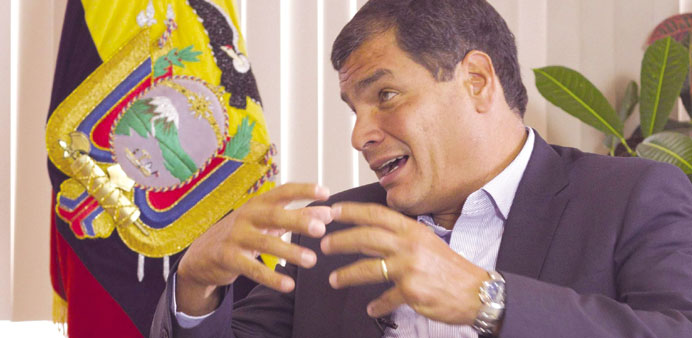Ecuador’s President Rafael Correa gestures during an interview in Quito.
Reuters/Quito
Ecuadorean President Rafael Correa expects to strike a landmark mining deal with Canadian firm Kinross within six months as he tries to attract more foreign investment after winning re-election on the weekend.
In an interview on Thursday, the 49-year-old leader also ruled out any major new socialist reforms during his next four-year term and said the South American country was well-placed to attract foreign companies.
Correa was re-elected on Sunday with 57% of the vote, about 34 percentage points ahead of his closest rival. Since taking office in 2007, he has won broad support with heavy spending on welfare, health, education and infrastructure projects.
He has also scared away investors by defaulting on $3.2bn of debt, rewriting contracts with oil companies to squeeze more revenue from them, pushing through a new constitution that gave him more power and making frequent outbursts against capitalism.
Correa said there would be “no more big changes” and that the country was now in good shape to attract foreign companies.
“We’ve got an honest government, a stable economy, clear rules and profitable projects. That’s what investors want,” he told Reuters, adding the days of social unrest were long gone, after street protests and coups ousted three presidents in the decade before he took office. “The rules of the game are clear and now we hope that investors will continue coming.”
Correa has already been in power longer than any other Ecuadorean leader since democracy was re-established in 1979 following a military dictatorship.
He said his ruling Alianza Pais party, which won a majority of seats in Congress on Sunday, would now push ahead with a mining reform allowing the government to sign a contract with Kinross for a large gold project.
Kinross’ Fruta del Norte project and the El Mirador copper mine being developed by Chinese-owned Ecuacorriente are seen as key projects in kick-starting Ecuador’s mining industry.
Correa said the Kinross deal would be finalised in August and would bring about $1.2bn in investment. Ecuacorriente reached a deal with the government last year and is expected to invest about $1.6bn.
“I don’t like mining, and open-pit is even worse, but it’s impossible to think of modern life without mining and it would be irresponsible not to use those resources. ... They can be key to fight poverty,” Correa said.
Heavy state spending, supported by high oil prices, has stoked strong growth in recent years. The economy expanded by 8% in 2011, and is forecast to have grown by 5% in 2012.
Correa also said that even though Ecuador had struggled to obtain financing, its ambitious $12.5bn Pacifico oil refinery project would be up and running on schedule in 2016.
China, Qatar and South Korea are interested in financing the project, which is a joint venture with Venezuela’s state oil company, PDVSA, he said.
Since a 2008 debt default, Ecuador has relied on credits from China and other multilateral lenders for financing, but Correa said the country could again consider issuing debt.
“We don’t rule that out. Thanks to God, we have had lots of sources of financing, but markets are like that. When you’re bankrupt, they don’t lend you money because it’s risky, but when you’re good, they look for you to lend you money,” he said.
“Now that the country is doing fine, capital markets open their arms to us. If we need funding we will take advantage of that opportunity.”

